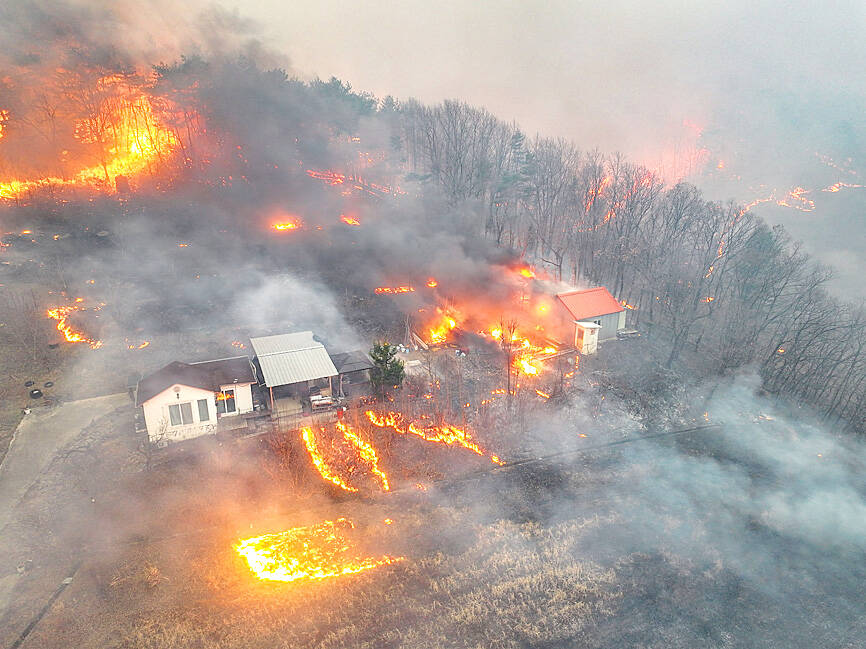Deadly wildfires in South Korea worsened overnight, officials said yesterday, as dry, windy weather hampered efforts to contain one of the nation’s worst-ever fire outbreaks.
More than a dozen different blazes broke out over the weekend, with Acting South Korean Interior and Safety Minister Ko Ki-dong reporting thousands of hectares burned and four people killed.
“The wildfires have so far affected about 14,694 hectares, with damage continuing to grow,” Ko said.

Photo: Yonhap via Reuters
The extent of damage would make the fires collectively the third-largest in South Korea’s history. The largest was an April 2000 blaze that scorched 23,913 hectares across the east coast.
More than 3,000 people have been evacuated to shelters, Ko said. At least 11 people have been seriously injured.
“Strong winds, dry weather and haze are hampering firefighting efforts,” Ko told a disaster and safety meeting.
The government is “mobilizing all available resources,” he said.
In Uiseong, the sky was full of smoke and haze. Workers at a local temple were attempting to move historical artefacts and cover up Buddhist statues to protect them from possible damage.
The Korea Forest Service said the containment rate for the fire in Uiseong decreased from 60 to 55 percent by yesterday morning.
More than 6,700 firefighters have been deployed to battle the wildfires, the South Korean Ministry of Interior and Safety said, with nearly two-fifths of the personnel dispatched to Uiseong.
The government declared a state of emergency in four regions, citing “the extensive damage caused by simultaneous wildfires across the country.”
Some types of extreme weather have a well-established link with climate change, such as heat waves or heavy rainfall. Other phenomena, such as forest fires, droughts, snowstorms and tropical storms can result from a combination of complex factors.
In Daegu and the North Gyeongsang region, “the air is extremely dry and strong winds are blowing, creating the risk that even a small spark could quickly spread into a large wildfire,” an official from the local meteorological administration said.
The fire in Uiseong was reportedly caused by an individual visiting a family grave.
The person told emergency services: “I accidentally started the fire while cleaning the grave site,” local media reported.
South Korea’s acting president confirmed this was likely the case.
“The wildfire is believed to have been caused by an individual who was visiting an ancestral grave and accidentally started the blaze,” South Korean Prime Minister Han Duck-soo said during a Cabinet meeting yesterday. “Most wildfires are caused by human negligence and the public should strictly follow wildfire prevention guidelines.”
Japan was also experiencing wildfires, with hundreds of firefighters battling a blaze in Imabari of western Ehime region since Sunday. Another wildfire, which also started on Sunday, was affecting the city of Okayama, burning about 250 hectares and damaging six buildings.
Japan experienced the nation’s worst wildfire in more than half a century earlier this month. It engulfed about 2,900 hectares and killed at least one person.

The collapse of the Swiss Birch glacier serves as a chilling warning of the escalating dangers faced by communities worldwide living under the shadow of fragile ice, particularly in Asia, experts said. Footage of the collapse on Wednesday showed a huge cloud of ice and rubble hurtling down the mountainside into the hamlet of Blatten. Swiss Development Cooperation disaster risk reduction adviser Ali Neumann said that while the role of climate change in the case of Blatten “still needs to be investigated,” the wider impacts were clear on the cryosphere — the part of the world covered by frozen water. “Climate change and

Poland is set to hold a presidential runoff election today between two candidates offering starkly different visions for the country’s future. The winner would succeed Polish President Andrzej Duda, a conservative who is finishing his second and final term. The outcome would determine whether Poland embraces a nationalist populist trajectory or pivots more fully toward liberal, pro-European policies. An exit poll by Ipsos would be released when polls close today at 9pm local time, with a margin of error of plus or minus 2 percentage points. Final results are expected tomorrow. Whoever wins can be expected to either help or hinder the

DENIAL: Musk said that the ‘New York Times was lying their ass off,’ after it reported he used so much drugs that he developed bladder problems Elon Musk on Saturday denied a report that he used ketamine and other drugs extensively last year on the US presidential campaign trail. The New York Times on Friday reported that the billionaire adviser to US President Donald Trump used so much ketamine, a powerful anesthetic, that he developed bladder problems. The newspaper said the world’s richest person also took ecstasy and mushrooms, and traveled with a pill box last year, adding that it was not known whether Musk also took drugs while heading the so-called US Department of Government Efficiency (DOGE) after Trump took power in January. In a

It turns out that looming collision between our Milky Way and Andromeda galaxies might not happen after all. Astronomers on Monday said that the probability of the two spiral galaxies colliding is less than previously thought, with a 50-50 chance within the next 10 billion years. That is essentially a coin flip, but still better odds than previous estimates and farther out in time. “As it stands, proclamations of the impending demise of our galaxy seem greatly exaggerated,” the Finnish-led team wrote in a study appearing in Nature Astronomy. While good news for the Milky Way galaxy, the latest forecast might be moot